
Charles Martel was a Frankish political and military leader who, as Duke and Prince of the Franks and Mayor of the Palace, was the de facto ruler of the Franks from 718 until his death. He was a son of the Frankish statesman Pepin of Herstal and a noblewoman named Alpaida. Charles, also known as "The Hammer", successfully asserted his claims to power as successor to his father as the power behind the throne in Frankish politics. Continuing and building on his father's work, he restored centralized government in Francia and began the series of military campaigns that re-established the Franks as the undisputed masters of all Gaul. According to a near-contemporary source, the Liber Historiae Francorum, Charles was "a warrior who was uncommonly ... effective in battle".
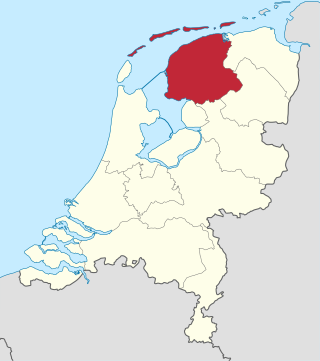
Friesland, historically and traditionally known as Frisia, named after the Frisians, is a province of the Netherlands located in the country's northern part. It is situated west of Groningen, northwest of Drenthe and Overijssel, north of Flevoland, northeast of North Holland, and south of the Wadden Sea. As of January 2020, the province had a population of 649,944 and a total area of 5,749 km2 (2,220 sq mi).
The Frisians are an ethnic group indigenous to the coastal regions of the Netherlands and northwestern Germany. They inhabit an area known as Frisia and are concentrated in the Dutch provinces of Friesland and Groningen and, in Germany, East Frisia and North Frisia. The name is probably derived from frisselje. The Frisian languages are spoken by more than 500,000 people; West Frisian is officially recognised in the Netherlands, and North Frisian and Saterland Frisian are recognised as regional languages in Germany.

Year 719 (DCCXIX) was a common year starting on Sunday of the Julian calendar, the 719th year of the Common Era (CE) and Anno Domini (AD) designations, the 719th year of the 1st millennium, the 19th year of the 8th century, and the 10th and last year of the 710s decade. The denomination 719 for this year has been used since the early medieval period, when the Anno Domini calendar era became the prevalent method in Europe for naming years.
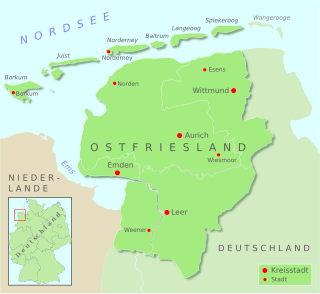
East Frisia or East Friesland is a historic region in the northwest of Lower Saxony, Germany. It is primarily located on the western half of the East Frisian peninsula, to the east of West Frisia and to the west of Landkreis Friesland.

Francia, also called the Kingdom of the Franks, Frankish Kingdom, Frankland or Frankish Empire, was the largest post-Roman barbarian kingdom in Western Europe. It was ruled by the Frankish Merovingian and Carolingian dynasties during the Early Middle Ages. Francia was among the last surviving Germanic kingdoms from the Migration Period era.
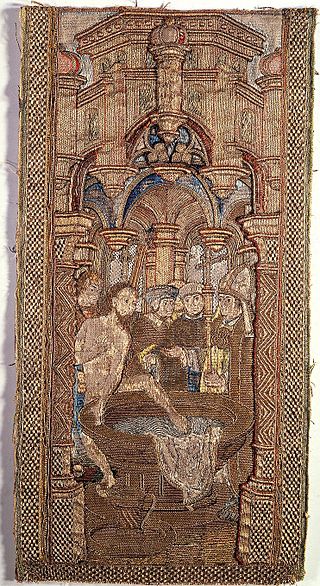
Radbod was the king of Frisia from c. 680 until his death. He is often considered the last independent ruler of Frisia before Frankish domination. He defeated Charles Martel at Cologne. Eventually, Charles prevailed and compelled the Frisians to submit. Radbod died in 719, but for some years his successors struggled against the Frankish power.
Lex Frisionum, the "Law Code of the Frisians", was recorded in Latin during the reign of Charlemagne, after the year 785, when the Frankish conquest of Frisia was completed by the final defeat of the Saxon rebel leader Widukind. The law code covered the region of the Frisians.

The Frisii were an ancient Germanic tribe living in the low-lying region between the Rhine–Meuse–Scheldt delta and the River Ems.
Harald 'Klak' Halfdansson was a king in Jutland around 812–814 and again from 819–827.
The Friso-Hollandic Wars, also called Frisian-Hollandic Wars, were a series of short medieval wars consisting of the attempts made by the counts of Holland to conquer the free Frisian territories, which lay to the north and east of their domain. These wars were waged off and on from 1256 to 1297, 1324 to 1348, 1396 to 1411, and from 1421 to 1422, although it could be argued that a state of war continued to exist between the County of Holland and the Frisian territories till well after the year 1500.

Frisian freedom was the absence of feudalism and serfdom in Frisia, the area that was originally inhabited by the Frisians. Historical Frisia included the modern provinces of Friesland and Groningen, and the area of West Friesland, in the Netherlands, and East Friesland in Germany. During the period of Frisian freedom the area did not have a sovereign lord who owned and administered the land. The freedom of the Frisians developed in the context of ongoing disputes over the rights of local nobility.
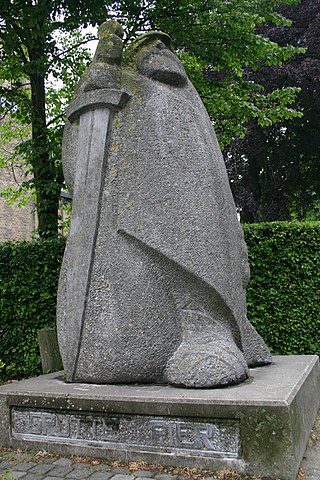
Frisia has changed dramatically over time, both through floods and through a change in identity. It is part of the Nordwestblock which is a hypothetical historic region linked by language and culture,where they may have spoken an Indo-European language which was neither germanic nor celtic.

The Frisian–Frankish wars were a series of conflicts between the Frankish Empire and the Frisian kingdom in the 7th and 8th centuries.

The Frisian Kingdom, also known as Magna Frisia, is a modern name for the post-Roman Frisian realm in Western Europe in the period when it was at its largest (650–734). This dominion was ruled by kings and emerged in the mid-7th century and probably ended with the Battle of the Boarn in 734 when the Frisians were defeated by the Frankish Empire. It lay mainly in what is now the Netherlands and – according to some 19th century authors – extended from the Zwin near Bruges in Belgium to the Weser in Germany. The center of power was the city of Utrecht.
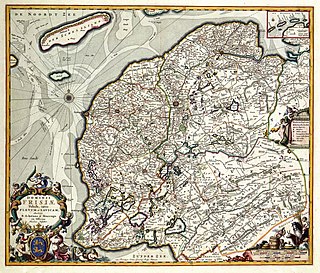
The Lordship of Frisia or Lordship of Friesland was a feudal dominion in the Netherlands. It was formed in 1498 by King Maximilian I and reformed in 1524 when Emperor Charles V conquered Frisia.

The Great Frisian War was an armed conflict in Frisia which lasted nine years in the 15th century, from 1413 to 1422.
The Netherlands in the early Middle Ages was inhabited by various Germanic tribes, including the Frisians, who played a significant role in the development of the region and its Christianisation and eventual incorporation into the Frankish Empire.













